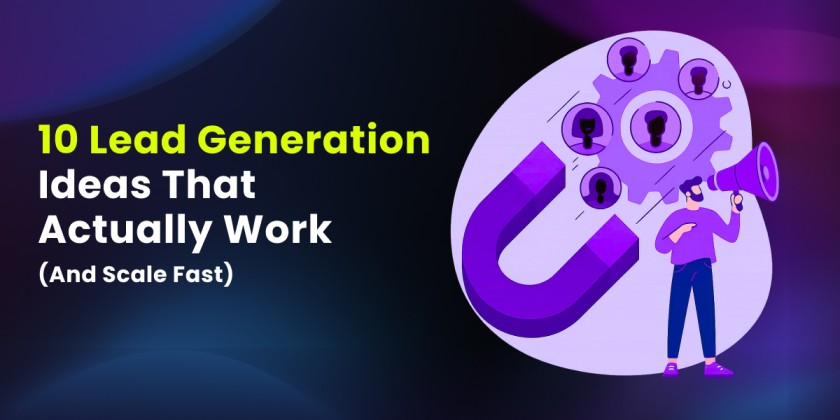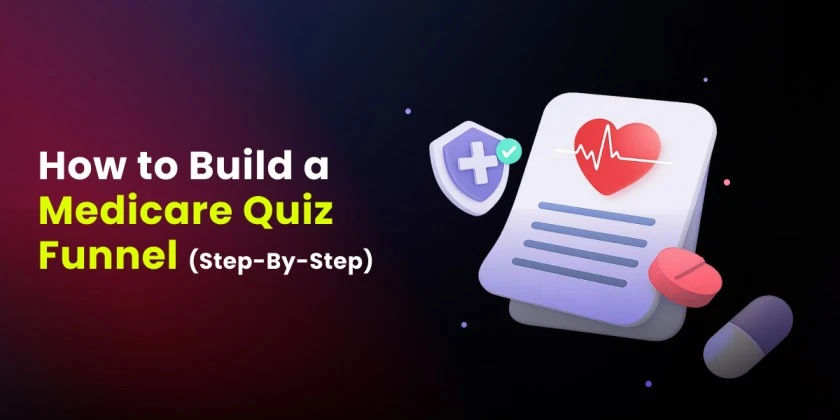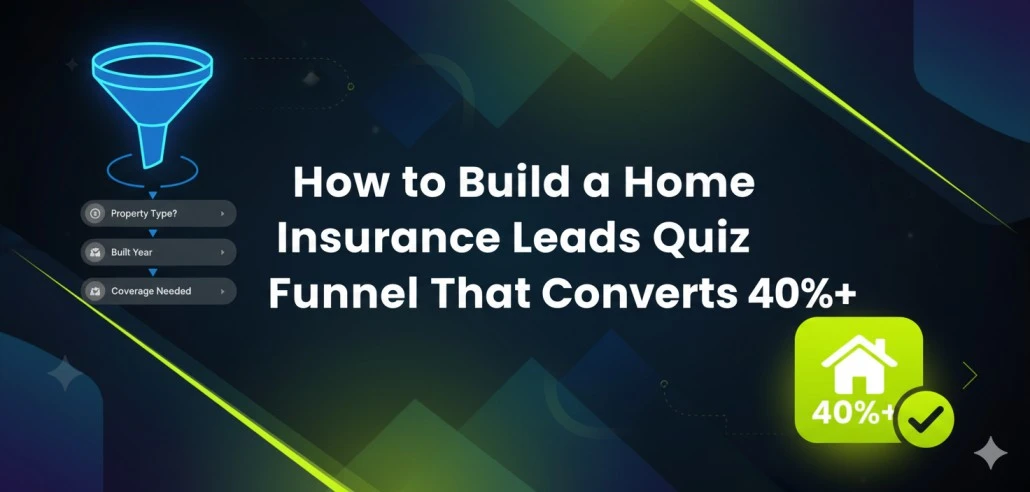Quizzes are crushing traditional lead magnets when it comes to conversion rates. While standard landing pages typically convert at 10-15%, interactive quizzes consistently achieve more than 40% conversion rates. This makes lead generation quizzes a powerful tool for marketers looking for qualified leads.
The magic of quizzes lies in their conversational nature. Prospects don’t just passively read content. Instead, they actively participate, creating a personalized experience. This delivers value to them rather than hitting them with obvious sales pitches.
This two-way interaction naturally filters audiences based on interest and engagement. It helps separate casual browsers from serious prospects, allowing you to capture leads who are genuinely interested in your offerings.
But not all quizzes perform equally well at generating high-quality leads. The most effective types of lead generation quizzes are strategically crafted to attract and identify high-intent leads, those most likely to convert from leads into customers. Even something as simple as the structure or number of quiz funnel questions can significantly impact completion rates and lead quality.
This article explores the quiz types that consistently deliver qualified leads across industries. From diagnostic quizzes that pinpoint specific problems to value-based quizzes that align with prospect priorities, we’ll examine what makes each format effective and how to apply it in your marketing strategy.
Once we’re done, hopefully you’ll know which lead generation quiz types best match your business goals and target audience.
📌 Key Takeaways:
- Interactive quizzes perform 3-4 times better than traditional lead magnets.
- Picking the right quiz type matters. For B2B companies with complex sales cycles, assessment and diagnostic quizzes work best. For B2C brands, personality and value-based quizzes drive higher engagement.
- Serious leads qualify themselves by taking quizzes, helping your sales team save time by filtering out casual browsers from people actively looking for solutions.
- Two-way conversations generate more valuable data than passive lead magnets, giving you deeper insights into what prospects need, what they like, and why they buy.
- A well-designed quiz funnel can change casual visitors into sales-ready leads by providing immediate value with personalized results before asking for contact information.
Jump to Section:
Understanding Lead Intent and Quiz Marketing
Lead intent refers to how ready a prospect is to make a purchasing decision. Understanding these levels helps marketers tailor their quiz strategies to attract the right audience at the right time:
Low-Intent Leads
These prospects are in the early awareness stage. They might be casually exploring options without immediate plans to purchase. They’re typically looking for educational content and general information.
Medium-Intent Leads
These prospects recognize they have a problem and are actively researching solutions. They’re currently comparing options but have yet to choose a specific solution or timeline.
High-Intent Leads
Prospects now have a clear understanding of their problem and are actively seeking a solution. These leads have both the authority and budget to make a purchase decision soon. They show specific interest in product details, pricing information, and usage processes.

Characteristics of High-Intent Leads
High-intent leads typically display several key behaviors:
- They ask specific, detailed questions about products or services
- They spend significant time engaging with solution-oriented content
- They willingly provide more contact information and business details
- They respond positively to follow-up communications
- They have visited pricing or comparison pages
- They demonstrate urgency in their language and behavior
How Quizzes Qualify Leads Through Engagement
Lead gen quizzes work as powerful qualification tools because they:
- Create two-way conversation: Unlike passive content consumption, quizzes require active participation, increasing engagement and attention.
- Gather progressive information: Each question collects valuable data about the prospect’s situation, needs, and preferences.
- Provide immediate value: Quiz results deliver personalized insights that help solve the prospect’s immediate problem while showcasing your expertise.
- Self-qualify participants: The very act of quiz completion demonstrates investment of time and interest in a solution.
- Segment audiences naturally: Quiz responses allow automatic sorting of leads based on their needs, challenges, and readiness to buy.
Psychology Behind Quiz Participation
Understanding why quizzes are so engaging helps create more effective lead generation tools. Quizzes effectively use the following psychological principles:
- Curiosity gap: People are naturally driven to close knowledge gaps about themselves or topics of interest.
- Self-discovery: Quizzes tap into our desire to learn about ourselves and validate our self-perceptions.
- Reciprocity: When you provide valuable insights through quiz results, prospects feel more inclined to reciprocate by providing contact information.
- Cognitive commitment: The investment of time in completing a quiz creates psychological momentum toward continued engagement.
- Personalization: Custom results create a sense that you understand the prospect’s unique situation better than competitors.
Because of these, quizzes help reduce landing page bounce rates and even capture the visitors’ interest towards the brand.
Create a Quiz That Converts Like Crazy
Turn your traffic into qualified leads with interactive quizzes; no tech skills are required. LanderLab gives you beautiful templates, real-time lead capture, and analytics that help you grow smarter.
7 Types of Lead Gen Quizzes to Use
Now that you know why you should use quizzes to generate more leads, let’s talk about the actual types.
1. Assessment Quizzes
Assessment quizzes evaluate a participant’s current state, skill level, or knowledge in a specific area relevant to your business. They measure where prospects stand against industry benchmarks or best practices, creating immediate value by providing personalized results.
Key characteristics include:
- Objective evaluation of current status or capability
- Comparison against established standards or benchmarks
- Actionable feedback based on user’s answers
- Clear connection between identified gaps and your solution
- Educational component that establishes your authority
Assessment quizzes work particularly well for high-intent lead generation because they attract prospects who are already aware of their needs and interested in evaluating their current position. The very act of seeking assessment indicates readiness to address identified shortcomings.
Examples of Assessment Quizzes
- Skill Assessments
These quizzes measure how good someone is at specific technical skills. Examples include digital marketing skills assessments, coding aptitude tests, or checks on sales methodology knowledge.
They appeal to professionals who want to confirm their abilities or find areas where they can learn more.
- Knowledge Tests
These check how well someone understands industry concepts, rules, or technical details. Examples include GDPR compliance checks, quizzes on industry terms, or practice tests for technical certifications.
- Readiness Evaluations
These determine if a prospect is ready for a particular change or new system. Examples include assessments of readiness for cloud migration, tests on preparedness for digital transformation, or evaluations for implementing enterprise software.
Note: These quizzes don’t just apply to the people taking the test, it can also be applied to aspects of the businesses they represent.
Real Life Examples of Assessment Quizzes
Grammarly’s Writing Assessment
Grammarly offers a free writing assessment that looks at text for grammar, clarity, engagement, and delivery issues. The assessment gives enough value to show what the tool can do while pointing out areas where the paid version would provide even more help.
This creates a natural upgrade path for high-intent users who recognize the value of improving their writing.
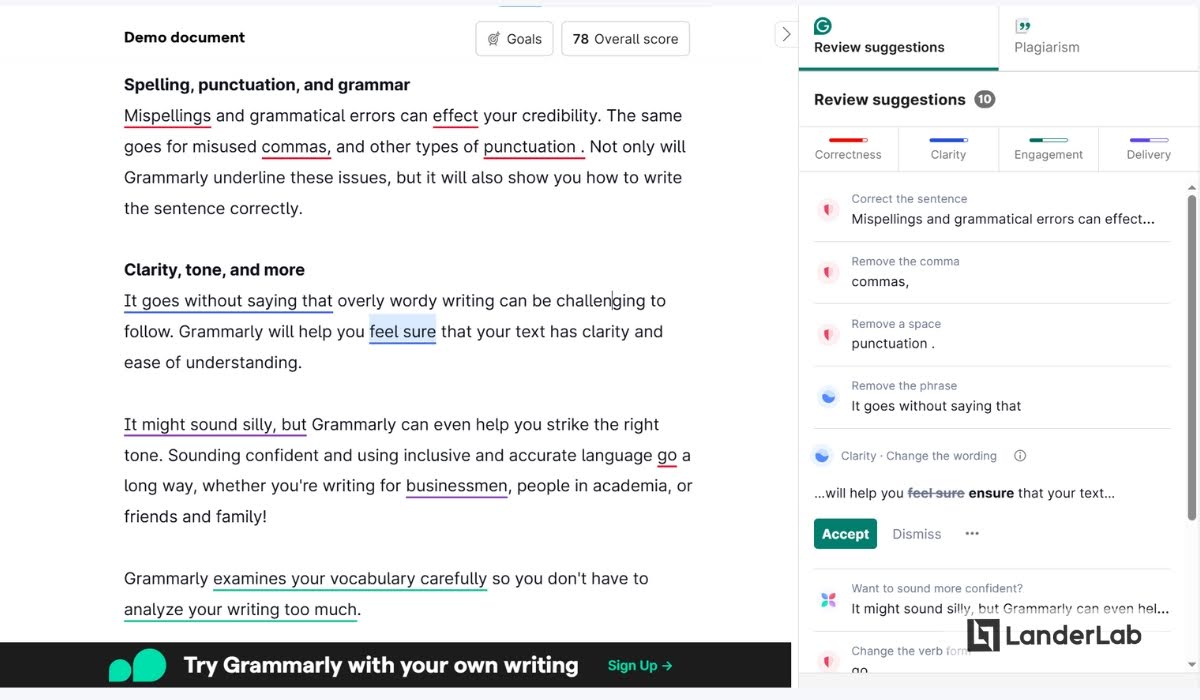
HubSpot’s Website Grader
This tool checks a website’s performance, SEO (search engine optimization), security, and mobile-friendliness. It gives a complete score and specific tips for improvement.
The smart part of this assessment is how simple it is (you only need to enter a URL to start) and how it connects directly to HubSpot’s solutions. By finding specific website problems, it makes quiz takers immediately aware of needs that HubSpot products can fix.
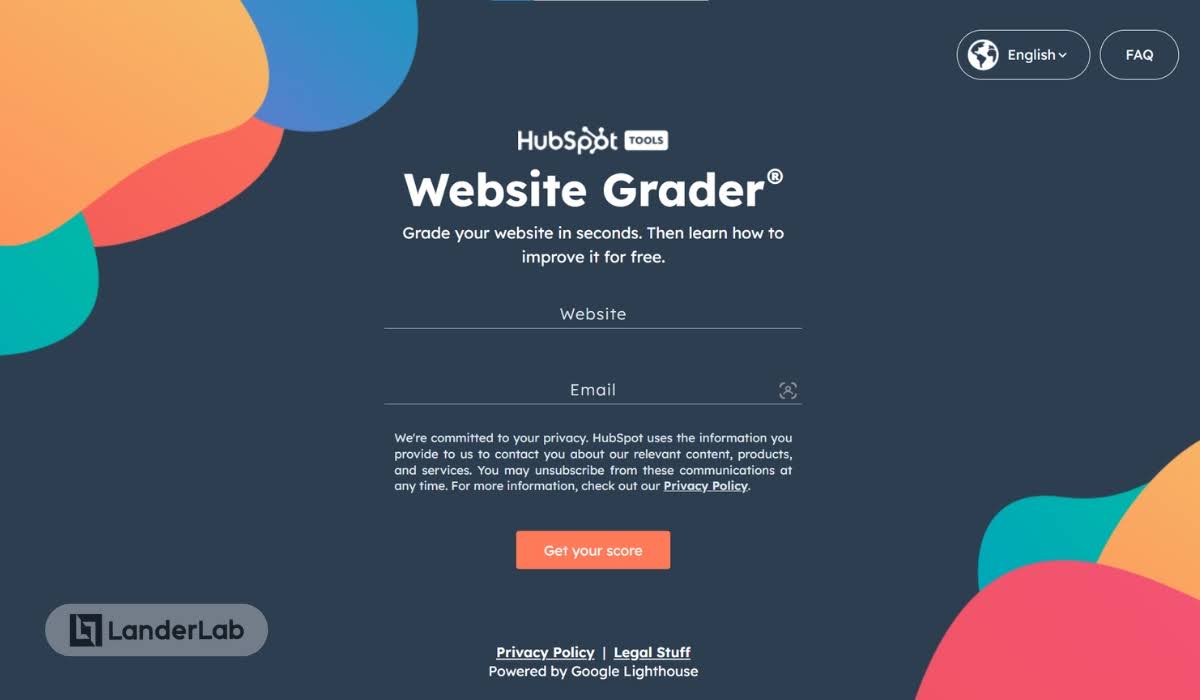
2. Solution Finder Quizzes
Solution finder quizzes help prospects identify the best product, service, or approach for their specific needs. Unlike assessment quizzes that evaluate current state, solution finders focus on matching customer requirements to appropriate offerings.
These quizzes act as virtual consultants, guiding users through a decision-making process that might otherwise require a sales conversation.
Key characteristics include:
- Focus on prospect needs rather than knowledge or skills
- Multiple potential outcomes based on different user profiles
- Personalized recommendations from your product/service catalog
- Educational elements that help users understand solution criteria
- Emphasis on fit and compatibility rather than scoring
Solution finder quizzes attract high-quality leads because they target prospects who have already identified a need and are actively seeking solutions. They’ve moved beyond awareness and are now evaluating options—a clear indicator of purchase intent.
Examples of Solution Finder Quizzes
- Product Recommenders
These quizzes match potential customers with specific products based on their preferences, requirements, and constraints. They’re particularly effective for companies with diverse product lines where selection might overwhelm customers.
- Service Matchers
These help prospects identify which service package or approach best addresses their unique situation. They work well for consultants, agencies, and professional service providers with tiered or specialized offerings.
- Need Analyzers
These quizzes help users understand their underlying needs when they might not fully know the solution landscape. They work well in complex or technical industries where prospects may find it hard to explain what they’re looking for.
Real Life Examples of Solution Finder Quizzes
Sephora’s Skincare Quiz
This interactive quiz asks detailed questions about skin type, concerns, and what users prefer before suggesting specific skincare products.
What makes this quiz experience work so well is how it teaches users throughout the process. It explains why certain quiz questions matter and how different ingredients help with specific skin concerns.
This teaching part builds trust while guiding serious prospects to products that fit their needs perfectly. Once users complete the quiz, a lead generation form appears naturally in the process.

Warby Parker’s Frame Quiz
Warby Parker’s quiz helps customers find eyeglass frames that match their style preferences, face shape, and practical needs. By asking about color preferences, frame size, and how they plan to use the glasses, the quiz narrows down hundreds of options to a smaller selection of recommended frames.
The quiz creates valuable leads by addressing common buying concerns and ending with a clear invitation to try frames at home with just a few clicks.

3. Diagnostic Quizzes
Diagnostic quizzes help find specific problems, inefficiencies, or ways to improve in a prospect’s business, strategy, or process.
Unlike assessment quizzes that measure overall performance or ability, diagnostic quizzes focus on finding particular pain points or issues that need to be fixed.
Key characteristics include:
- Problem-centric rather than solution-centric approach
- Identification of root causes rather than symptoms
- Quantification of impact or severity of issues
- Prioritization of problems based on urgency or importance
- Clear connection between diagnosed issues and available remedies
Diagnostic quizzes are particularly effective for lead generation because they attract prospects who recognize they have problems but may not fully understand their causes or solutions. This awareness indicates readiness to invest in fixing identified issues.
Examples of Diagnostic Quizzes
- Problem Identifiers
These quizzes pinpoint specific issues affecting business performance. Examples include sales pipeline bottleneck analyzers, marketing campaign performance diagnostics, or customer service efficiency audits.
- Gap Analyzers
These identify discrepancies between current and optimal states. Examples include digital maturity gap assessments, workflow efficiency diagnostics, or compliance risk evaluations.
- Health Checks
These evaluate the overall condition of a system, process, or strategy. Examples include SEO health checks, financial wellness assessments, or organizational culture diagnostics.
Real Life Examples of Diagnostic Quizzes
CoSchedule’s Headline Analyzer
This diagnostic quiz evaluates how effective your headlines are based on several key metrics. It analyzes headline structure, word choice, and emotional impact to identify weaknesses in your content marketing approach.
The analyzer provides a numerical score along with specific feedback on headline length, power words, and emotional triggers.
What makes this diagnostic work so well is how it connects identified weaknesses directly to headline suggestions for improvement that align with CoSchedule’s content marketing platform.
This creates a strong case for the value of their tools and helps identify leads who are ready to improve their content marketing.
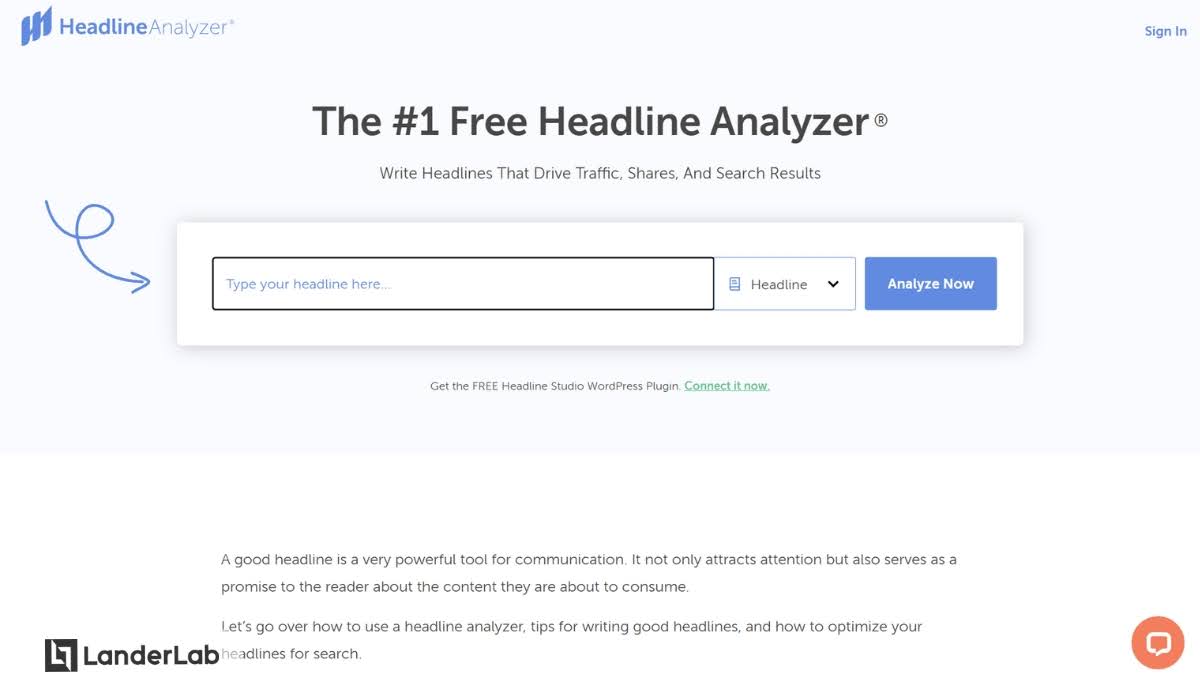
SEMrush’s Site Audit
While it’s more of a tool than a traditional quiz, SEMrush’s Site Audit works as a diagnostic by finding specific SEO issues that affect website performance. Users enter their domain and get a detailed report showing problems like broken links, missing meta descriptions, and crawlability issues.
Each identified problem links to SEMrush tools and resources that can help fix the issue. This creates a natural path to conversion for high-intent leads.
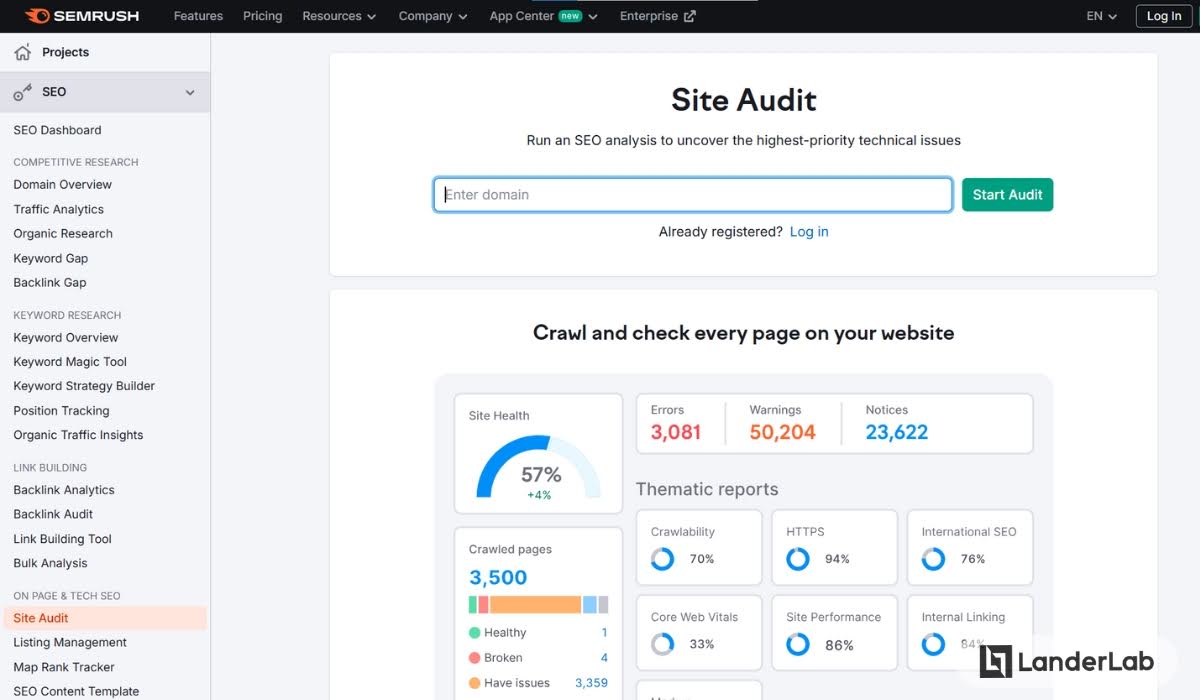
4. Persona-Based Quizzes
Persona-based quizzes sort participants into distinct customer types or buyer personas based on their preferences, behaviors, challenges, and goals.
These personality quiz formats engage prospects by offering insights into their decision-making styles or professional identities. At the same time, they segment participants for more targeted marketing.
Key characteristics include:
- Categorization into distinct, relatable persona types
- Focus on behavioral patterns and preferences rather than problems
- Engaging, often personality-driven content
- Immediate self-identification with a defined group
- Tailored recommendations based on persona classification
Persona-based quizzes attract quality leads by appealing to people’s desire for self-knowledge and personalized guidance.
They’re particularly effective because they create an instant connection between the prospect’s identity and your solution, making recommendations feel more relevant and compelling.
Examples of Persona-Based Quizzes
- Customer Archetypes
These quizzes categorize users into characteristic customer types. Examples include investing style profiles for financial services, learning style assessments for educational products, or management style evaluations for leadership development offerings.
- Buyer Personas
These align participants with established marketing personas. Examples include technology adoption profiles (innovators, early adopters, etc.), decision-making style assessments, or consumer behavior pattern identifiers.
- Segment Identifiers
These place participants into broader market segments. Examples include business maturity classifications, career stage identifiers, or industry-specific role categorizations.
Real Life Examples of Persona-Based Quizzes
BuzzFeed Style Quiz Adapted for B2B
Several B2B companies have successfully adapted the engaging BuzzFeed style quiz format for lead generation.
For example, a marketing automation company might create “What Kind of Digital Marketer Are You?” with results like “Data-Driven Optimizer,” “Creative Campaign Master,” or “Growth Hacking Innovator.”
Each persona gets tailored product recommendations that highlight features addressing their specific working style and challenges. Using this approach helps create a lead generation quiz that feels fun rather than sales-focused.
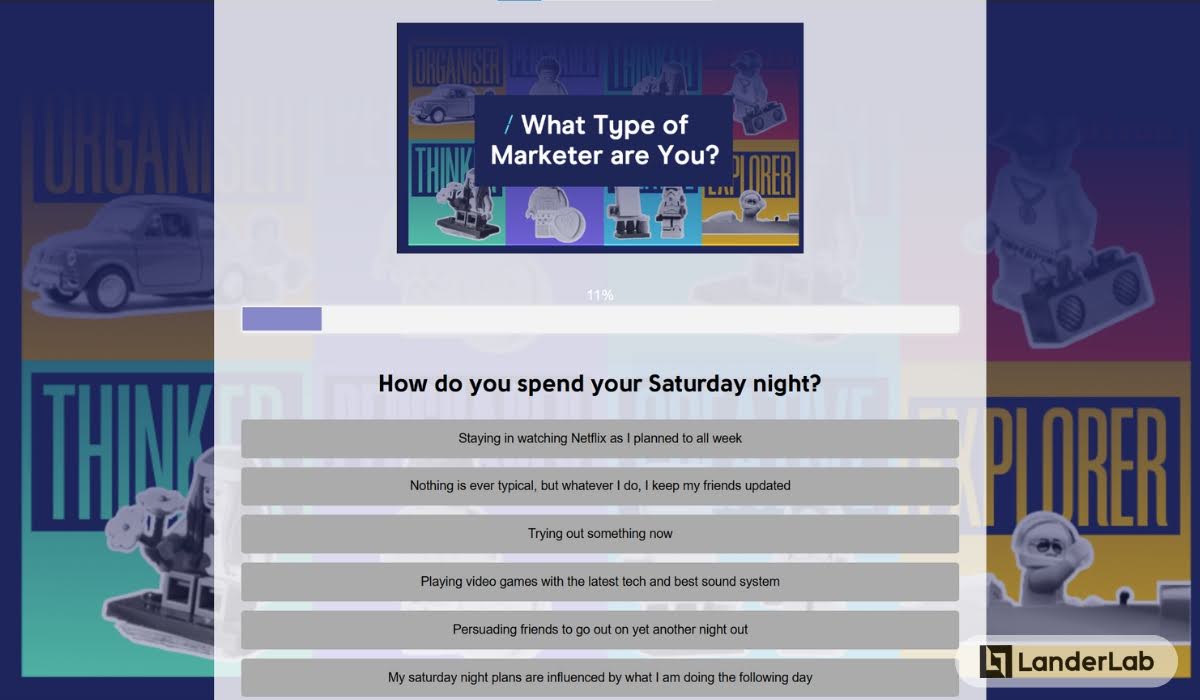
Aircall’s Support Persona Quiz
Aircall offers a persona-based quiz that helps customer service professionals discover their unique support style. This 5-minute assessment evaluates how participants approach support challenges, motivate themselves and their teams, and engage with customers.
The results categorize participants into distinct support personas, each with their own strengths and blind spots.
What makes this quiz particularly effective is how it helps participants gain self-awareness about their support approach while subtly demonstrating Aircall’s expertise in the customer service space.
By understanding their support personality, participants can identify areas for growth and see how Aircall’s communication tools align with their natural support style. The quiz creates value first by offering genuine insights, making the follow-up lead form feel like a logical next step for those wanting to enhance their customer service capabilities.
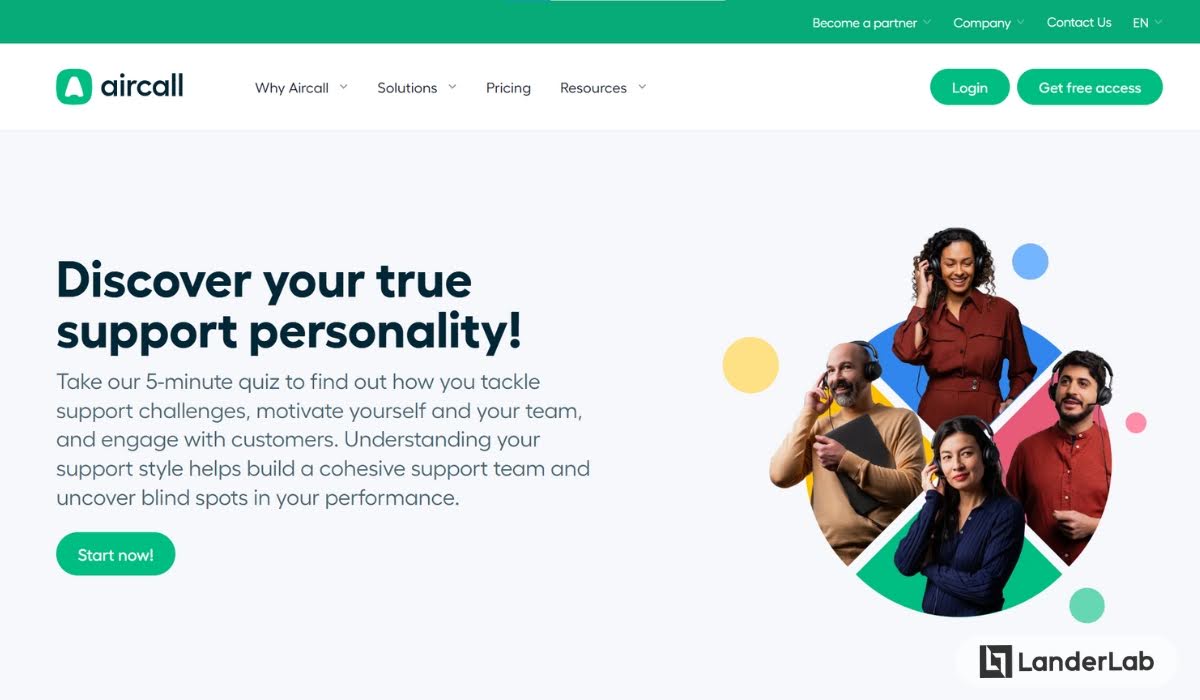
5. Values-Based Quizzes
Values-based quizzes look at what matters most to potential customers: their main priorities, beliefs, and values related to business decisions or product choices.
These quizzes dig deeper than just practical needs. They uncover the real motivations and principles that affect buying decisions. This helps create stronger connections between brands and the people who might buy from them.
Key characteristics include:
- Focus on why choices matter rather than what choices to make
- Exploration of priorities and trade-offs
- Alignment of personal or organizational values with brand values
- Emphasis on purpose and meaning behind decisions
- Connection between values and business outcomes
Value-based quizzes are particularly effective for attracting high-intent leads because they engage prospects at a deeper level than feature or benefit discussions. By addressing fundamental motivations, these quizzes attract prospects who are seeking more than just functional solutions—they want partnerships with aligned values.
Examples of Values-Based Quizzes
- Priority Assessments
These help users identify what matters most to them when making decisions. Examples include sustainability priority assessments, leadership values inventories, or corporate social responsibility evaluations.
- Values Alignment
These match user values with product or service attributes. Examples include ethical investment profile assessments, sustainable consumption quizzes, or purpose-driven business evaluations.
- Philosophy Matchers
These connect users with brands or approaches that share their worldview. Examples include business philosophy identifiers, management approach assessments, or innovation mindset evaluations.
Real Life Examples of Values-Based Quizes
The Nature Conservancy’s Carbon Footprint Quiz
Thisquiz helps participants quantify their environmental impact through questions about lifestyle choices, consumption patterns, and daily habits. Rather than simply collecting information, the assessment explores the values that drive transportation choices, energy usage, and consumption decisions.
The quiz calculates a personal carbon footprint score while revealing which environmental values matter most to the participant. By connecting these deeply held values to The Nature Conservancy’s conservation programs and offset initiatives, the quiz naturally attracts environmentally conscious individuals seeking to align their actions with their values.
This creates qualified leads who are predisposed to support The Nature Conservancy’s mission, making the transition to donation or membership feel like a meaningful way to address the personal impact they’ve just discovered.
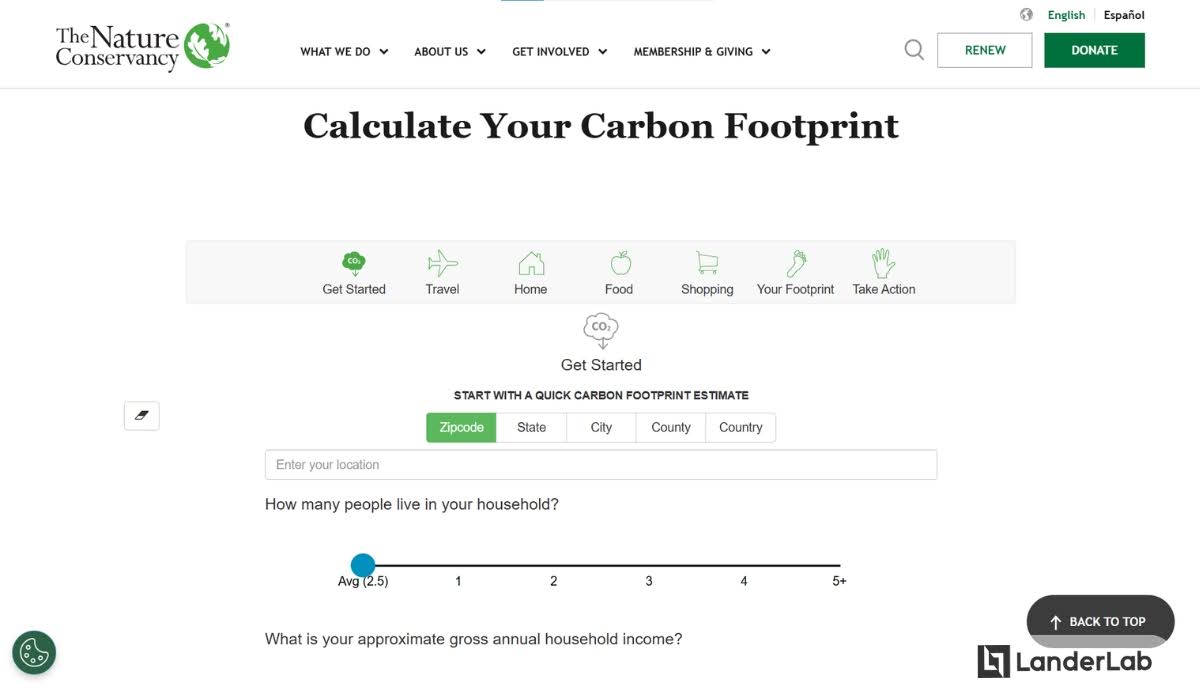
MarCloud’s Salesforce Data Cloud Readiness Assessment
This values-based quiz helps organizations evaluate their readiness to implement advanced customer data solutions based on their data governance philosophy and organizational priorities.
Rather than focusing solely on technical requirements, the assessment explores participants’ values and capacities regarding data integration, customer experience personalization, and cross-departmental collaboration.
Participants receive a personalized readiness profile that aligns their organizational data values with implementation readiness for Salesforce Data Cloud.
By addressing the deeper principles behind data platform decisions—such as commitment to unified customer experiences versus departmental data ownership—the quiz attracts decision-makers who value strategic data approaches over quick technical fixes.
This creates qualified leads who understand MarCloud’s expertise in guiding organizations through meaningful data transformation, making their consulting services a natural next step for those committed to responsible, value-aligned data implementation.
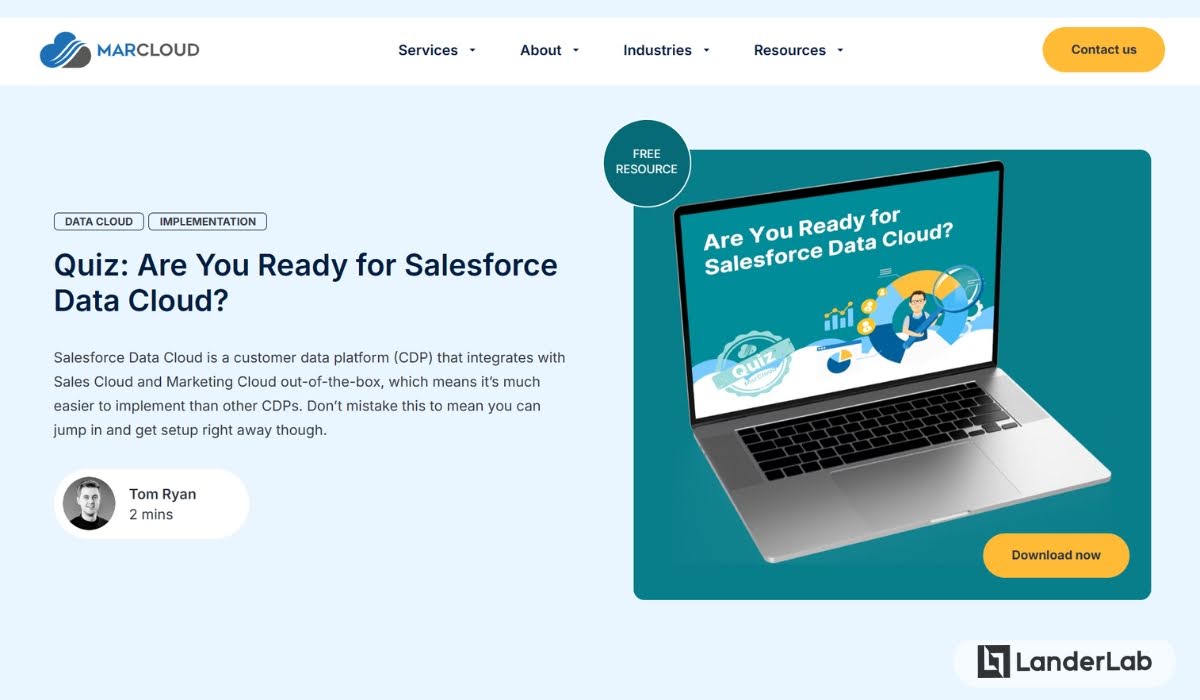
6. Trivia and Knowledge Quizzes
Trivia and knowledge quizzes test participants’ understanding of industry-specific information, trends, or best practices.
Unlike more serious assessment tools, these quizzes often incorporate entertaining or surprising elements while still providing valuable insights and educational content.
Key characteristics include:
- Focus on industry knowledge and awareness
- Educational content delivery in an engaging format
- Mix of basic and advanced questions to appeal to different expertise levels
- Interesting facts or surprising statistics
- Competitive elements that encourage sharing and comparison
While seemingly lighter in tone than other quiz types, trivia and knowledge quizzes are surprisingly effective at generating high-intent leads.
They attract professionals who are actively engaged in your industry, have existing knowledge, and are interested in expanding their expertise—all indicators of serious intent.
Examples of Trivia and Knowledge Quizzes
- Industry Knowledge Tests
These quizzes check how well someone knows the special terms, practices, and rules in a specific field. For example, companies might create quizzes about marketing automation systems, cybersecurity awareness, or human resources rules.
- Trend Awareness Quizzes
These quizzes measure how well participants know about new developments in their field. Some examples include quizzes about what’s new in digital marketing, tests about emerging technologies, or assessments about changes in regulations.
- Best Practice Challenges
These tests knowledge of established best practices in a given domain. Examples include project management methodology quizzes, customer experience best practice tests, or operational excellence assessments.
Real Life Examples of Trivia and Knowledge Quizzes
Moz’s SEO Expert Test
Moz created an SEO knowledge quiz that tests participants’ understanding of search engine optimization concepts, from basic terminology to advanced technical considerations.
The quiz provides immediate feedback on each answer, explaining correct responses and offering additional resources on challenging quiz topics.
This educational approach establishes Moz’s authority while identifying participants with sufficient SEO knowledge to be potential leads for their more advanced tools. The lead capture form appears naturally after showing quiz answers and explanations.
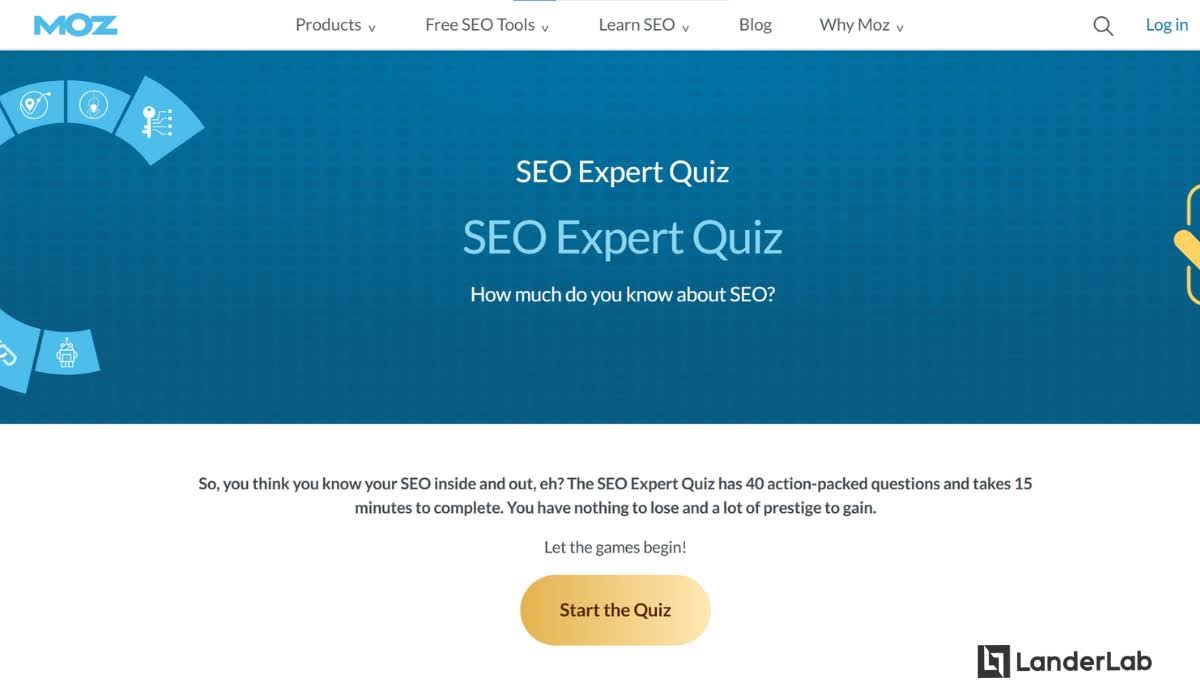
IBM’s AI Readiness Quiz
IBM developed a knowledge quiz to help organizations assess their understanding of artificial intelligence concepts and implementation requirements.
The quiz mixes general AI knowledge questions with practical implementation scenarios, helping identify both knowledge gaps and readiness for AI adoption.
Results provide personalized resources based on knowledge level and specific areas of interest, creating natural pathways to IBM’s AI solutions. This helps IBM capture leads who are genuinely interested in implementing AI.
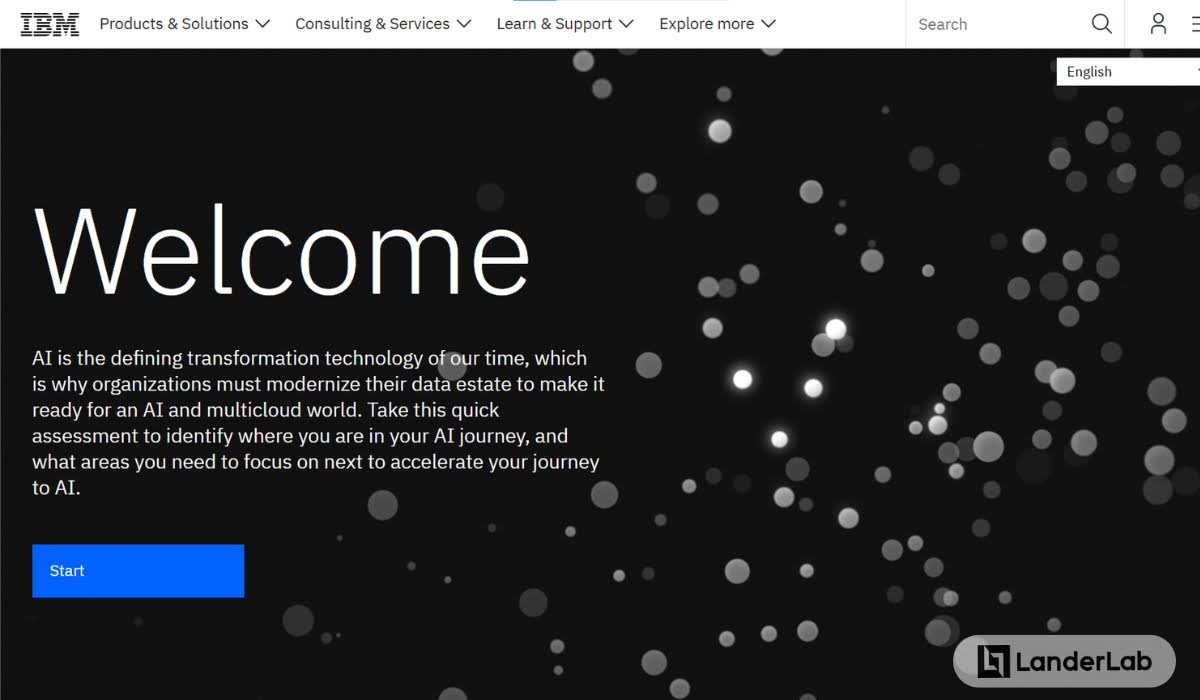
The Quiz Effect: Where Engagement Meets Insight
Interactive quizzes have evolved from simple engagement tools to sophisticated lead qualification engines that attract high-intent prospects across industries. The quiz types we talked about in this article all have different purposes for getting new leads.
But they share one big strength: they create two-way conversations that find people who are truly interested.
The best quiz marketing strategies often mix several types of quizzes or borrow elements from different approaches. For example, an assessment quiz might include some persona-based questions, or a solution finder might add value-based questions to better understand potential customers.
When choosing the right quiz type for your business, think about how complex your sales process is, what problems your target audience typically faces, and what factors most influence their buying decisions.
For complex B2B sales with long consideration phases, diagnostic or assessment quizzes typically perform best. For consumer brands with emotional purchase drivers, value-based or personality quizzes often generate more leads.
No matter which approach you pick, remember that the main goal isn’t just to collect email addresses through a lead capture form—it’s to start meaningful conversations with people who really need what you offer.
When you create quizzes that provide valuable information while finding quality leads, you turn quiz marketing from a numbers game into a strategic tool for long-term growth.
Want to generate leads through interactive content? First, identify which generation quizzes best match what your audience needs and what makes your product valuable. Then use our strategies to create an engaging quiz experience that converts visitors to leads.
For quicker results, look at online quiz maker tools like LanderLab that offer ready-to-use page templates made specifically for lead generation.
With its drag-and-drop builder, tracking integration, and easy email capture feature, your own lead generation quiz could be just a few clicks away!
What are you waiting for? Start now and create quizzes that deliver personalized results and watch your lead-nurturing efforts improve dramatically.

